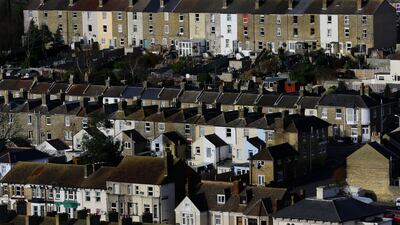Millions of families across Britain are facing an average increase of £5,100 ($5,629) in their annual mortgage payments between now and the end of 2024, according to new analysis.
The Bank of England is expected to raise base interest rates from just 0.25 per cent, which they were at the start of the year, to 5.5 per cent by July 2023.
About 7.4 million householders have a mortgage on their main home in Britain. Roughly 1.2 million are already on variable deals, and will see swift rises in their repayments in line with the central bank's base rate.
Another 1.7 million households will see their mortgage payments rise later this year in the fourth quarter, including 500,000 households on new fixed-rate deals — and a further 400,000 households will pay more from early 2023.
That means by the end of 2024, 5.1 million mortgaged households — close to one fifth of all households in Britain today — will be spending more on their repayments as a result of higher mortgage rates.
Lindsay Judge, Research Director at the Resolution Foundation think tank, said: “Households across Britain are currently living through an inflation-driven cost-of-living crisis as pay packets shrink and energy bills rise.”
“The government has responded with policies such as the welcome Energy Price Guarantee. But the Bank of England is responding too by raising interest rates, which will benefit savers but cause a fresh living standards crunch for mortgaged households across Britain,” she said.
“Between now and the next election, Britain is on track for a £26 billion mortgage hike as over five million households see their annual mortgage payments rise by £5,100 on average.”
In London, average payments are set to rise £8,000 between now and the end of 2024, said the foundation.
That is more than twice the level of the £3,400 increase experienced by mortgaged households in Wales.
But the impact will be less concentrated in London, where fewer than 19 per cent of people have a mortgage.
“With almost half of all mortgagor households on course to see their family budgets fall by at least 5 per cent from higher payments, the living standards pain from rising interest rates will be widespread,” said Ms Judge.

According to the Resolution Foundation, £1,200 of the £5,100 average rise in mortgage costs is the result of changes in interest rates expectations since the Conservative government's mini budget was announced on September 23.
Lenders expect the availability of mortgages and consumer and corporate credit to shrink in the coming months as more people and businesses default on loans, according to a Bank of England survey.
The Credit Conditions Survey reported mortgage availability to households had already decreased in the three months to the end of August — and is expected to fall further in the coming months.
The availability of non-mortgage credit to households has also decreased slightly and is expected to fall further.
The latest survey was carried out between August 30 and September 16, before the mini budget was unveiled.
The number of available mortgages nosedived in the days following the mini budget amid market volatility. As deals have returned, average mortgage rates have been heading upwards.
Figures released by Moneyfacts.co.uk on Thursday indicated that there has been some steadying in average mortgage rates in the past couple of days, following the rapid increases.
The average two-year fixed-rate mortgage is now at 6.46 per cent, according to Moneyfacts.co.uk, while a typical five-year fixed-rate mortgage is at 6.28 per cent, down slightly from 6.32 per cent on Wednesday.
On the day of the mini budget, the average two-year fixed deal was 4.74 per cent and the average five-year fixed mortgage was 4.75 per cent.
The soaring costs of mortgages is forcing some parents to dip into their own savings to help their children get on the property ladder.
According to The Great British Retirement Survey 2022, 17 per cent of lower income households give their children half their annual income for the purpose.
Rising rates and the cost-of-living crisis are predicted to result in a crash in the property market, taking house prices back to 2013 levels and sparking a big drop in consumer spending, a top City economist has warned.
Simon French, senior economist at Panmure Gordon, said house prices will fall 14 per cent over the next three years as mortgage costs surge.
This would take the average house price adjusted for inflation back to levels last seen in the first quarter of 2013, before the government's Help to Buy scheme was introduced.
The average UK house price shrank in September, after hitting a record high the previous month.
The average price is now £293,835, figures compiled by Halifax bank show, after prices fell by 0.1 per cent.


